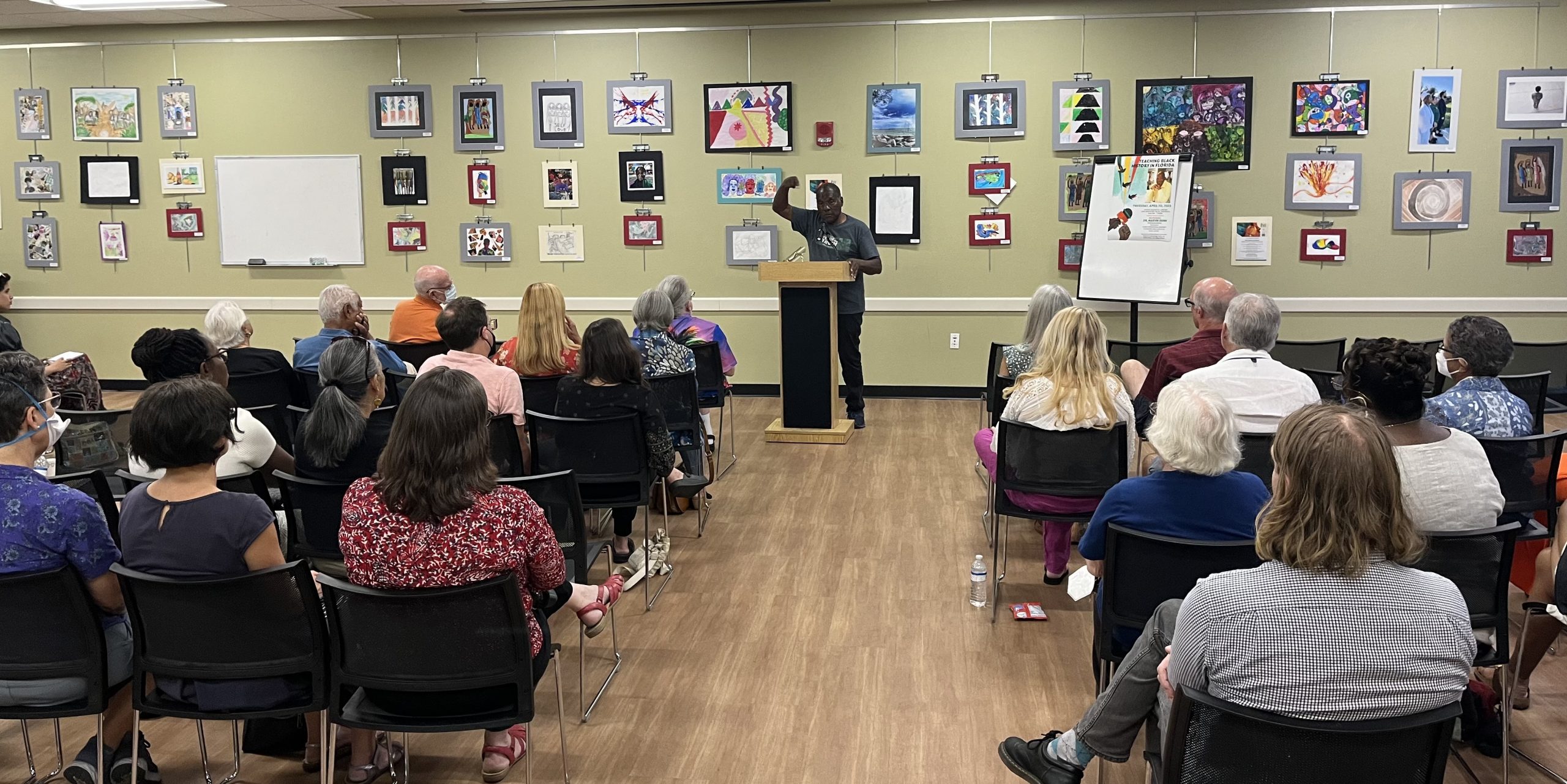“Black history is American history,” Dr. Marvin Dunn, professor emeritus from the Department of Psychology at Florida International University (FIU) stated firmly during his lesson to the larger Sarasota community on Apr. 20 in the Betty J. Johnson North Sarasota Public Library. “Teaching Black History in Florida” stood as an opportunity to engage students, teachers, parents and locals interested in learning in-depth about the experiences of Black Americans, specifically through the accounts of Dunn himself. The event was organized and run by the New College Anthropology, History and Gender Studies Programs along with the Black Student Union (BSU) to not only comment on the political encroachment of education in Florida, but to allow for diverse perspectives to be showcased to the wider community.
Preceding the public event on the same day, Dunn lectured as a guest speaker in the course, American History Survey, taught by Visiting Assistant Professor of History Erik Wallenberg. Also speaking during this class was Emeritus Professor of Political Science at University of California (UC) Peter Irons, who is also a member of the Supreme Court Bar. About 35 students, staff and faculty from various backgrounds attended the open class period, in Soo Bong Chae Auditorium.
The two scholars went on to engage the minds of everyone present, recounting their experiences with racial segregation and discrimination, discussing historical moments that could soon be banned from lessons in schools across Florida.
Both Dunn and Irons spoke on how the uncomfortable realities of segregation and systemic racism are vital to continue speaking about and acknowledging, especially in learning environments.
“You’re in university, you’re supposed to be uncomfortable,” Dunn stated.. “Learning is uncomfortable!”
“The last two words that I spoke [systemic racism] are forbidden in this state because it’s real,” Irons added.
The class ended on a high note after every student received a signed copy of Dunn’s book A History of Florida Through Black Eyes (2016). He began describing his “Teach the Truth” tour, which takes students across Florida to learn about Black history straight from the historical places they occurred in. Tour stops so far have included Rosewood, Cedar Key and Shiloh Cemetery, and Dunn also hopes to bring students down to the Florida Keys through Miami and Washington D.C. to New York City. The only cost, Dunn said, would be food.
Dunn took things an extra step further, specifically for New College students, by imploring Interim President Richard Corcoran via email to allow Dunn to hold Zoom classes on the Black history of Florida “with the greatest minds” to all students at no cost in the Fall.
“Over a month ago I emailed the President,” Dunn recounted to students in the quiet Chae auditorium. “I have not had a reply.”
“We want Black history at New College to be the place […] to learn American history,” Dunn continued. “We want to make that a rewarding experience. I will teach at New College if I must do it in the parking lot.”
Later that day, Dunn introduced himself in a similar fashion, offering a look into his childhood in Jim Crow era Central Florida. Stories of his parents, his past in the U.S. Navy and his denial from the University of Florida (UF) on the basis of the color of his skin left the room in complete and utter silence. Undivided attention was on Dunn for the duration of the event.
“I think it’s really horrifying, especially as an Africana Area of Concentration (AOC), how crucial and very meaningful books are being taken away,” second-year Jasmine Doyle said. “It’s very shocking from someone who wants to be a teacher when they’re older, it just leaves a question as to what’s next for Black educators. It’s very nice to see Dr. Dunn being a guidance, getting the question and getting it talked about.”
Students, parents of current students, alumni and Newtown community members all asked Dunn questions following his lesson. The thread of racial injustices, preserving Black history and working towards shared goals carried through until the Q&A session commenced.
“You must mobilize,” Dunn responded when asked what students can do in the face of suppressive legislation. “Most of the major social changes that I can cite in our country have had student involvement from the very, very beginning. […] Many of us who have never even heard of New College are with you. So, yes, go out and be peaceful, but make your feelings known.”

